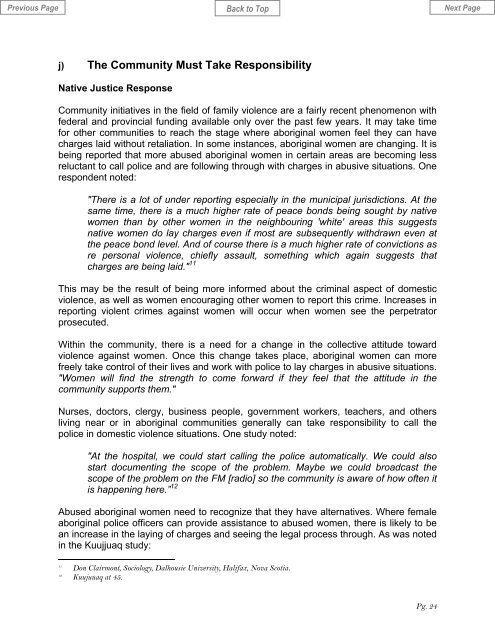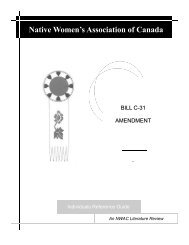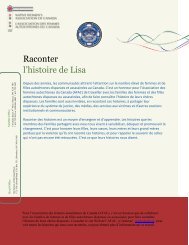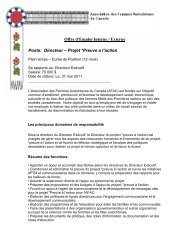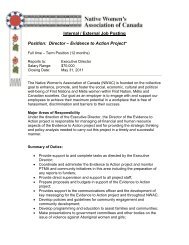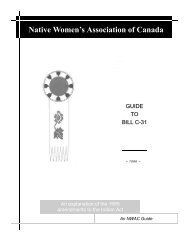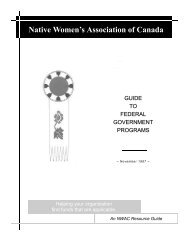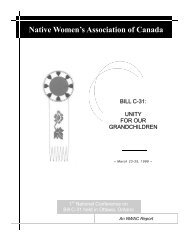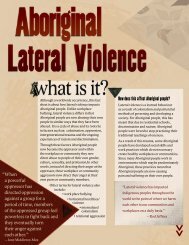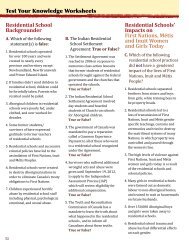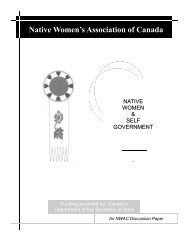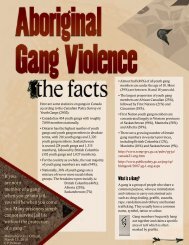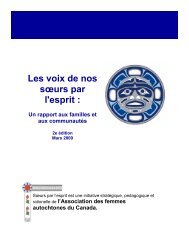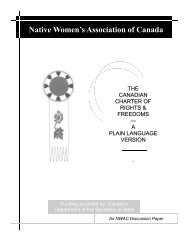POLICE CHARGING POLICIES & DOMESTIC VIOLENCE - Native ...
POLICE CHARGING POLICIES & DOMESTIC VIOLENCE - Native ...
POLICE CHARGING POLICIES & DOMESTIC VIOLENCE - Native ...
- No tags were found...
Create successful ePaper yourself
Turn your PDF publications into a flip-book with our unique Google optimized e-Paper software.
j) The Community Must Take Responsibility<strong>Native</strong> Justice ResponseCommunity initiatives in the field of family violence are a fairly recent phenomenon withfederal and provincial funding available only over the past few years. It may take timefor other communities to reach the stage where aboriginal women feel they can havecharges laid without retaliation. In some instances, aboriginal women are changing. It isbeing reported that more abused aboriginal women in certain areas are becoming lessreluctant to call police and are following through with charges in abusive situations. Onerespondent noted:"There is a lot of under reporting especially in the municipal jurisdictions. At thesame time, there is a much higher rate of peace bonds being sought by nativewomen than by other women in the neighbouring 'white' areas this suggestsnative women do lay charges even if most are subsequently withdrawn even atthe peace bond level. And of course there is a much higher rate of convictions asre personal violence, chiefly assault, something which again suggests thatcharges are being laid." 11This may be the result of being more informed about the criminal aspect of domesticviolence, as well as women encouraging other women to report this crime. Increases inreporting violent crimes against women will occur when women see the perpetratorprosecuted.Within the community, there is a need for a change in the collective attitude towardviolence against women. Once this change takes place, aboriginal women can morefreely take control of their lives and work with police to lay charges in abusive situations."Women will find the strength to come forward if they feel that the attitude in thecommunity supports them."Nurses, doctors, clergy, business people, government workers, teachers, and othersliving near or in aboriginal communities generally can take responsibility to call thepolice in domestic violence situations. One study noted:"At the hospital, we could start calling the police automatically. We could alsostart documenting the scope of the problem. Maybe we could broadcast thescope of the problem on the FM [radio] so the community is aware of how often itis happening here.” 12Abused aboriginal women need to recognize that they have alternatives. Where femaleaboriginal police officers can provide assistance to abused women, there is likely to bean increase in the laying of charges and seeing the legal process through. As was notedin the Kuujjuaq study:11Don Clairmont, Sociology, Dalhousie University, Halifax, Nova Scotia.12Kuujuuaq at 45.Pg. 24


